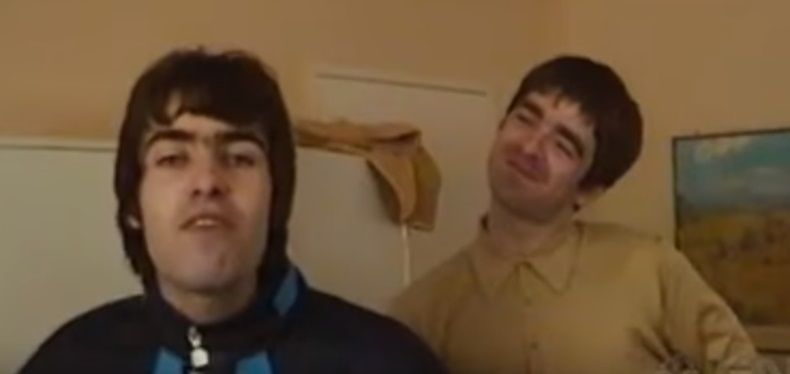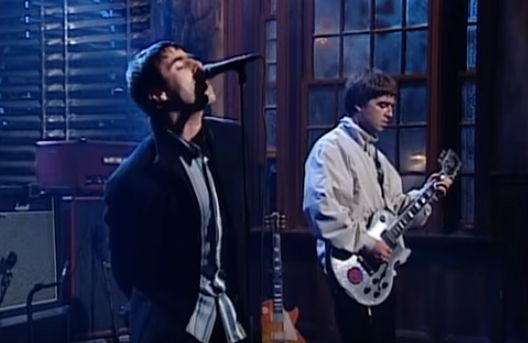

Share
14th October 2016
02:24pm BST

 Most of all, though, Oasis indirectly demonstrated the rewards of practice, belief and character, far extending beyond the world of music. The excellent Scottish comedian Kevin Bridges wrote to Noel some years after making it, thanking him for providing the courage he needed to follow his dream. He wasn’t talking about their songs.
Oasis were providing inspiration and confidence to all one minute and causing carnage the next. The masses were receptive and a sensation was born.
‘Has-beens shouldn’t be presenting awards to gonna-bes’
Oasis were the anti-heroes with a knowing smirk as the mainstream protagonists. They didn’t care and their fans didn’t either. Everyone was in this together.
Britpop, Blur, Blair, new Labour, Liverpool’s ‘Spice Boys’, Cantona’s United, The Prodigy, Alan Partridge, TFI Friday, Father Ted, Football’s Coming Home, andTrainspotting, with Oasis leading the charge. This was a young man’s game and suddenly, anyone could be someone. Opportunity was now affordable to the willing.
https://www.youtube.com/watch?v=5sdrXDxa5zE
On this side of the ocean, there was and still is a special affinity with brothers Gallagher thanks to their Irish heritage, with mother Peggy, originally from Mayo, the light of their lives. The unforgettable gigs at The Point in 1996 will live forever in Irish memory – where Noel famously barely got a word in during his acoustic Wonderwall rendition.
Youth culture was suddenly vibrant because it was all so tangible – the party had started and there was no catch-up option. These were exciting times, but there was a backbone of graft. It wasn’t all drunken sibling rivalry shenanigans.
Sure, Liam and Noel switched places on Top of the Pops, casually described thenational drug culture, and engaged in bitter feuds, but Oasis meant business behind the scenes.
In ‘Supersonic’, Liam is recorded singing a perfect version of Champagne Supernova, having just heard the song for the very first time. While Bonehead recounts his reaction of disbelief (“you didn’t just f*cking write that!”) when Noel initially played Live Forever to the gang. Substance behind the bravado.
That’s the truth. There was no short cut, but there was also no better stage than mid-90s UK and Ireland to strut your stuff. The people were waiting and they were in a good mood.
Most of all, though, Oasis indirectly demonstrated the rewards of practice, belief and character, far extending beyond the world of music. The excellent Scottish comedian Kevin Bridges wrote to Noel some years after making it, thanking him for providing the courage he needed to follow his dream. He wasn’t talking about their songs.
Oasis were providing inspiration and confidence to all one minute and causing carnage the next. The masses were receptive and a sensation was born.
‘Has-beens shouldn’t be presenting awards to gonna-bes’
Oasis were the anti-heroes with a knowing smirk as the mainstream protagonists. They didn’t care and their fans didn’t either. Everyone was in this together.
Britpop, Blur, Blair, new Labour, Liverpool’s ‘Spice Boys’, Cantona’s United, The Prodigy, Alan Partridge, TFI Friday, Father Ted, Football’s Coming Home, andTrainspotting, with Oasis leading the charge. This was a young man’s game and suddenly, anyone could be someone. Opportunity was now affordable to the willing.
https://www.youtube.com/watch?v=5sdrXDxa5zE
On this side of the ocean, there was and still is a special affinity with brothers Gallagher thanks to their Irish heritage, with mother Peggy, originally from Mayo, the light of their lives. The unforgettable gigs at The Point in 1996 will live forever in Irish memory – where Noel famously barely got a word in during his acoustic Wonderwall rendition.
Youth culture was suddenly vibrant because it was all so tangible – the party had started and there was no catch-up option. These were exciting times, but there was a backbone of graft. It wasn’t all drunken sibling rivalry shenanigans.
Sure, Liam and Noel switched places on Top of the Pops, casually described thenational drug culture, and engaged in bitter feuds, but Oasis meant business behind the scenes.
In ‘Supersonic’, Liam is recorded singing a perfect version of Champagne Supernova, having just heard the song for the very first time. While Bonehead recounts his reaction of disbelief (“you didn’t just f*cking write that!”) when Noel initially played Live Forever to the gang. Substance behind the bravado.
That’s the truth. There was no short cut, but there was also no better stage than mid-90s UK and Ireland to strut your stuff. The people were waiting and they were in a good mood.
 Roll With It. Earl’s Court. Wonderwall. Tantrums. Cast No Shadow. History-makers. Some Might Say. Maine Road. It’s all over. Don’t Look Back in Anger… Knebworth.
This is the point in the Oasis journey where it becomes hard to verbally justify their impact. By summer ’96, they briefly transcended music to become cultural phenomenons. Three years earlier, they couldn’t get a write-up from the local press. It was a genuinely unrealistic ascent and it’s captured perfectly in ‘Supersonic’.
When you realise that Oasis could have played for seven successive nights in Knebworth after nearly 5% of the UK’s population applied for tickets, you begin to comprehend the seismic scale.
As Noel lamented when prompted by Mat Whitecross, the 250,000 people that gathered in Knebworth on August 10 and 11 are etched in music folklore – for they were the last great gathering before the birth of the internet age and reality TV.
Nowadays, information and creative outlets are ubiquitous and people neither need nor want such a movement. It was a different world back then – slightly more mysterious but with just enough exposure in which to engage.
‘It’s all part of the masterplan’
Knebworth was the start of the end for the greatest period in music since the dawn of The Beatles, over 30 years prior.
Soon, the Spice Girls would burst onto the scene and music began to shift in a new direction again. Meanwhile, the wheels kept spinning. Oasis released the cocaine-fuelled Be Here Now. Or, as Noel would later call it, ‘F*ck it, that will do’.
Oasis were now enjoying the fruits of their labour and gone was the band’s intense drive to change the world. The hangover began while the students took notes, but the peak of people power over those three glorious years began to dissipate.
It was inevitable.
https://www.youtube.com/watch?v=tKHx6DIGalg
‘Some might say, we will find a brighter day’
It was a time of innocence and hope, when Liam’s voice was at its zenith, Noel didn’t know his creative limits and Oasis were the soundtrack for possibility.
And hey, if this mad crew from Manchester weren’t your cup of tea, there were plenty of other options out there. As Noel said, “It was just a great time to be alive.”
I shudder to think of the apathy if such a movement was launched today. Their behaviour wouldn’t be tolerated, their language moderated, their output more collaborative and their look more Hollywood. Basically, in the words of Liam, it’s all “too beige” now.
Had Oasis launched a few years earlier than they did, they probably would have been met with a world not prepared for their ignorance and posturing.
So, instead of longing for a reunion, we should cherish the past. It will never be like that again. It couldn’t possibly be.
https://www.youtube.com/watch?v=vYJ7pjfNcpc
Roll With It. Earl’s Court. Wonderwall. Tantrums. Cast No Shadow. History-makers. Some Might Say. Maine Road. It’s all over. Don’t Look Back in Anger… Knebworth.
This is the point in the Oasis journey where it becomes hard to verbally justify their impact. By summer ’96, they briefly transcended music to become cultural phenomenons. Three years earlier, they couldn’t get a write-up from the local press. It was a genuinely unrealistic ascent and it’s captured perfectly in ‘Supersonic’.
When you realise that Oasis could have played for seven successive nights in Knebworth after nearly 5% of the UK’s population applied for tickets, you begin to comprehend the seismic scale.
As Noel lamented when prompted by Mat Whitecross, the 250,000 people that gathered in Knebworth on August 10 and 11 are etched in music folklore – for they were the last great gathering before the birth of the internet age and reality TV.
Nowadays, information and creative outlets are ubiquitous and people neither need nor want such a movement. It was a different world back then – slightly more mysterious but with just enough exposure in which to engage.
‘It’s all part of the masterplan’
Knebworth was the start of the end for the greatest period in music since the dawn of The Beatles, over 30 years prior.
Soon, the Spice Girls would burst onto the scene and music began to shift in a new direction again. Meanwhile, the wheels kept spinning. Oasis released the cocaine-fuelled Be Here Now. Or, as Noel would later call it, ‘F*ck it, that will do’.
Oasis were now enjoying the fruits of their labour and gone was the band’s intense drive to change the world. The hangover began while the students took notes, but the peak of people power over those three glorious years began to dissipate.
It was inevitable.
https://www.youtube.com/watch?v=tKHx6DIGalg
‘Some might say, we will find a brighter day’
It was a time of innocence and hope, when Liam’s voice was at its zenith, Noel didn’t know his creative limits and Oasis were the soundtrack for possibility.
And hey, if this mad crew from Manchester weren’t your cup of tea, there were plenty of other options out there. As Noel said, “It was just a great time to be alive.”
I shudder to think of the apathy if such a movement was launched today. Their behaviour wouldn’t be tolerated, their language moderated, their output more collaborative and their look more Hollywood. Basically, in the words of Liam, it’s all “too beige” now.
Had Oasis launched a few years earlier than they did, they probably would have been met with a world not prepared for their ignorance and posturing.
So, instead of longing for a reunion, we should cherish the past. It will never be like that again. It couldn’t possibly be.
https://www.youtube.com/watch?v=vYJ7pjfNcpcExplore more on these topics: